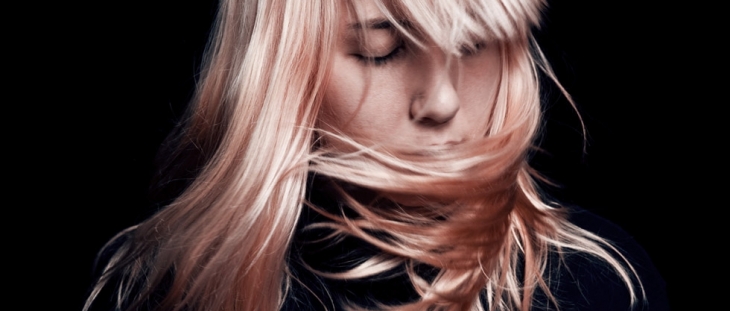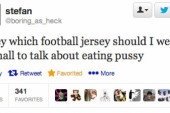
Many theological, mythological and esoteric traditions suggest that knowing an individual’s true name gives one power over them.
But the ancients never had to agonize over band names. Toronto’s Katie Stelmanis switched her stage moniker to Austra last year, and if that handle is less enigmatic than it seems – it’s just her middle name – the change corresponds with a greater musical one. The distorted keyboards and MIDI effects of her 2008 solo debut Join Us have given way to dark, atmospheric electro-pop on Austra’s Feel It Break, lushly produced and pledged to rhythm. “Beat and the Pulse,” the big dancefloor-slayer from an LP with several competitors, becomes downright anthemic live. So smitten were we that months before the record arrived we saw fit to choose Austra as the first artist to perform in our Friday Night at The Standard series (for which we constructed a giant cave).
The classically trained Stelmanis is no stranger to ensembles, both vast (she’s a Canadian Children’s Opera Company alumnus) and minimal (like Austra drummer Maya Postepski, she was a member of the latter-day riot grrrl trio Galaxy). This group just feels the closest to her aesthetic, even in those twin backup singers, Romy and Sari Lightman of the macabre duo Tasseomancy. Some of Austra’s most remarkable moments are the ones when her powerful, piercing soprano drops back behind the synths and bass, its icy grandeur sublimated into clouds of haze; but a voice this strong could never dial down for too long. Opera or house, ritual demands divas.
Why the switch from “Katie Stelmanis” to “Austra”? Was it just a matter of going from solo to a band, or were you consciously adopting a new stage persona?
The project had become way more collaborative, and it didn’t seem right that it was under my name, because it’s not really a solo project anymore. Also, going under a solo woman’s name, sometimes people have an idea of what you’re gonna sound like already. I would show up to a lot of gigs and they would assume that I was solo on piano. They had no idea that I have a band, or electronic beats or anything like that. In changing the name we wanted to pick something [more reflective] of the music we were making, and second of all, we ended up choosing a name that didn’t really represent anything for anybody. It was basically a blank slate, so we could turn the name into whatever we wanted.
The new material puts much more emphasis on rhythm. Had you been listening to more dance music?
I was definitely listening to more dance music. A lot of it also came out of a conscious effort to have the songs and the high-pitched, cerebral stuff translate better in a live situation or big venue. People need to feel the music when they go out and see a show, and if you don’t have drum and bass you’re not going to feel anything.
How does your classical training continue to influence your music?
I studied piano for 15 years and now I write everything on a keyboard. I also studied singing; I was in choirs for a long time. That was a huge influence because now I tend to use vocal harmonies, layers and layers of vocals. I studied opera for a long time, too, which I think shaped the genre of music that I’m playing right now. Opera is such an intense genre and because I was so in love with it it’s natural that I’d make really intense, dramatic music.
There’s been a small wave of new music/classical/indie collaborations in recent years. Grizzly Bear and Nico Muhly, for example, or the Knife writing an opera about Charles Darwin. But opera still seems mostly ignored in those circles.
I don’t really want to see opera cross over into the indie-rock world. I think that a lot of the best operas are already written, and opera is a type of music that we almost don’t need any more of. Opera was created to fill these huge theatres before they had amplification, and that’s why the singers would sing the way they did. Obviously there’s still a lot of beautiful music to be written for opera singers. But I can’t foresee it ever happening on as huge a scale as anyone could experience seeing a full Puccini opera at the Metropolitan Opera.
We have this caricature now of the opera audience as stuffy people with monocles, but they were a much wider cross-section of society than we imagine. And the castratos were like rock stars.
A lot of the old opera halls were standing room-only, and it would be like a big party when you went. People would be laughing, enjoying themselves. There were the high opera houses, the ones where they’d perform for the king and queen – more like how we experience opera now. But for most, it was a form of entertainment, like Shakespeare. And that was just wild parties, pretty much.
You’ve said that you tend to approach lyrics as vowels and sounds rather than words. Maybe because of the opera training?
Every song that I write, I mumble out everything before I put words to anything. The words are the very last thing to happen in a song for me. When I studied opera, every time I learned a song I would have to learn it without any consonants. Your voice would get to know the way it’s supposed to work around these words; consonants can really get in the way. Once I’ve developed the song and the melody, I’ll put the words in last and only words that fit. I’m not gonna ruin a nice melody with a really wordy phrase.
What was it like working with [producer] Damian Taylor? You’ve said that you admire or are inspired by Bjork, and he’s her–
BFF? He works with her in very close quarters.
Yeah.
It was great working with Damian. He loves strong women, and he really understands and works well with women, and I find that’s rare among producers and engineers. He works with Bjork, his manager is a woman, he just loves girl bands.
In the beginning it was a little bit intimidating; we just wanted to do whatever he said. He knows everything because he works with Bjork, so obviously he knows what’s up. But then, halfway through the recording process, it was like: Okay, I don’t like this, and I have to give myself credit for knowing what I like, even if I’m not like Bjork. This is my record and I know what I want to sound like. Then I found that he was just so open to our ideas, so responsive and receptive to everything we were saying.
A lot of the people I’ve worked with get really defensive or angry if you tell them you don’t like something. He made us feel so comfortable to do what we wanted and say what we wanted. The most valuable thing about him and Bjork, which is probably the reason they get along, is that he really knows when to step back. Which is a hard thing to do. I think as a producer or a mixer or whatever your role is, it’s one of the most valuable things you can do when you’re working with an artist.
I heard that the song “Young and Gay” is a tribute to the late artist, promoter and DJ Will Munro.
Yeah. I had kind of written the song, but didn’t have lyrics for it yet, and I just… I was really, really sad when Will Munro died, like a lot of other people. I wanted to do something in tribute to him, because he played a really direct and personal role in my life and the way I grew up in Toronto. Being a teenager and discovering gayness and discovering music. He definitely carved out a space in Toronto for me that I think, if it wasn’t there, I don’t think I’d be the same person.
I was way too young for the early years of Vazaleen parties Munro put on, but it seems like he opened up a space for people who didn’t necessarily fit in the old “gaybourhood” on Church St. He created this important and beautiful thing for them to all congregate around.
Yeah, and not even just gay people. Mike [Haliechuk] from Fucked Up [whose One Big Silence label released Austra’s “Beat and the Pulse” single] used to go to all the early Vazaleens, and he doesn’t have a gay bone in his body. Essentially, it was a love of music that brought everybody together.
The only music video for “Beat and the Pulse” left on YouTube is that “clean” version. Did they censor the original clip?
Well, we had to censor it. But yeah, we did the blurring, because they wouldn’t let us put it on YouTube.
What was your reaction to that?
It wasn’t a surprise. YouTube has archaic politics, especially because there’s so much hateful stuff on the site, a lot of really violent imagery, racist, hateful imagery, a lot of offensive things. It’s just funny that they choose breasts to be the most offensive thing to look at, as opposed to a lot of other things they put up on there. I wasn’t surprised by it, it’s just a reflection of where North America’s values are. Sex is a bad thing and violence is not.
The word “goth” comes up a lot in articles about Austra, and as a teenager who owned lots of industrial albums and Sandman comics, I have to ask: Do you embrace that word, that tag? Do you identify with the aesthetic at all?
I feel like “goth” is a favourite word among journalists right now, and not really a favourite word among artists. Journalists are calling everyone who has a slightly dark aesthetic to their music goth. I’ve never intended to make goth music. But I’ve always been drawn to the darker side of things, to a dark aesthetic, to sad, melancholy music. This is the type of music I’ve always been making. It’s just that right now there’s such a pop culture resurgence of goth; you even see it in high fashion. But in three years, when the goth fad fades out, people will probably start thinking of other words to describe the music.














